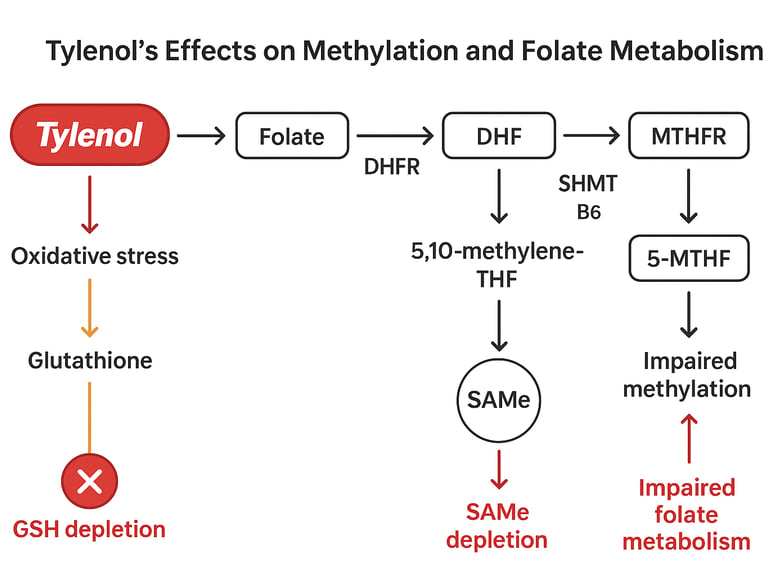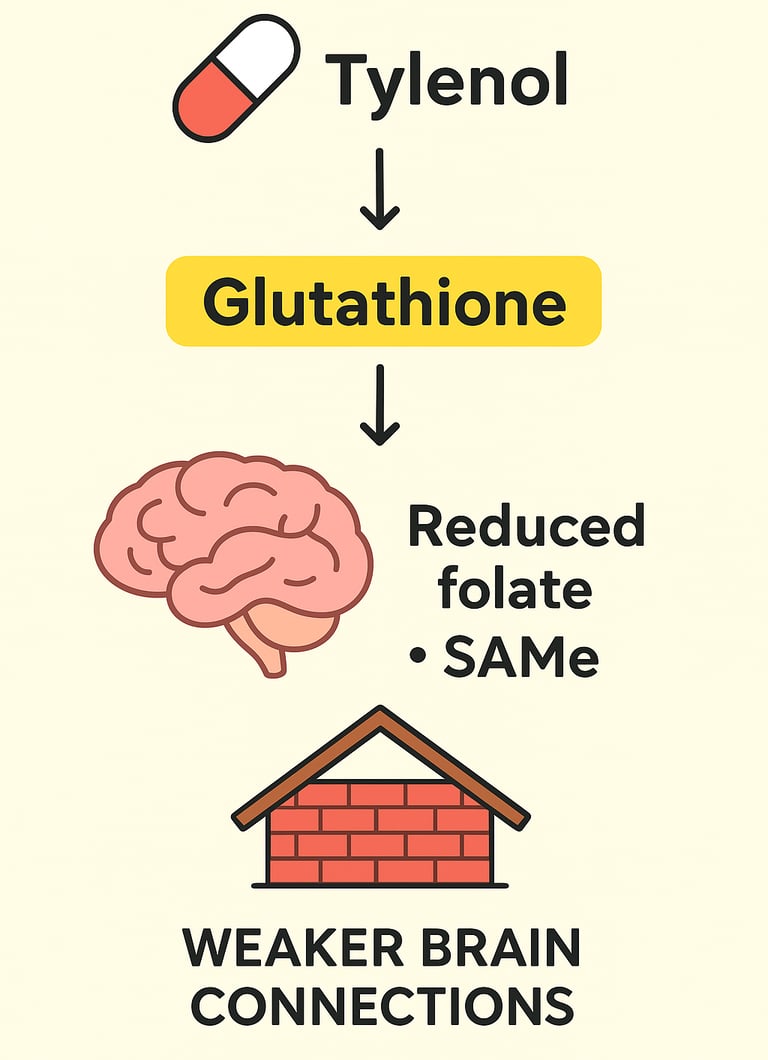"Uncover the truth behind the groundbreaking discovery of the causes of the world's biggest problems. 'The Root Causes' will change how you view the world!"
The Potential Impact of Tylenol on Brain Development in Young Children
Tylenol (acetaminophen) can indirectly affect brain development in babies and young children. It doesn’t directly block folate (vitamin B9), but it can use up antioxidants like glutathione, which protect brain cells. When glutathione is low, folate and SAMe (a key brain chemical) may not work as well, slowing processes like DNA formation, neuron signaling, and synapse growth. This can make the “building blocks” of the brain less effective during critical stages of development. Think of it like building a house: folate and SAMe are the bricks and mortar, glutathione is the protective workers, and Tylenol in high amounts temporarily reduces the workers, so some bricks may not get placed properly, leading to weaker brain connections. Disclaimer: This information is for educational purposes only and is not medical advice. Always consult a qualified healthcare professional before taking any medication during pregnancy or giving it to children. #Tags: #Tylenol #Acetaminophen #Pregnancy #ChildDevelopment #BrainHealth #Folate #VitaminB9 #Glutathione #SAMe #Methylation #OxidativeStress #Neurodevelopment #AutismRisk #InfantHealth #RFK #RFKHealth #RFKScience #RFKResearch
Glenn Rosaroso Vale, MT(AMT), MS(IT), MBA
10/1/20252 min read


How Tylenol (Acetaminophen) Might Affect Brain Development in Young Children
Tylenol is one of the most common medicines for fever and pain, used by millions of parents and pregnant women. Most of the time, it’s safe. But research suggests that repeated or high-dose use, especially in babies or during pregnancy, might affect brain development indirectly. Here’s how.
1. How Tylenol Affects Important Brain Chemicals
Our brains need folate, a vitamin also called vitamin B9, to grow properly. Folate helps make DNA, build brain cells, and form the connections between neurons called synapses.
Tylenol doesn’t directly block folate, but it can use up the body’s antioxidants—especially one called glutathione (GSH)—which protect brain cells. Without enough antioxidants:
Folate doesn’t work as well.
Other brain chemicals that depend on folate, like SAMe (a “methyl donor”), get low.
Methylation, a process needed for DNA, brain signaling, and nerve insulation, slows down.
2. Why This Matters for Babies and Young Children
Babies’ brains are still forming millions of synapses—the connections that let neurons talk to each other.
These synapses are very sensitive to stress and chemical changes.
If antioxidants like glutathione are low, oxidative stress can harm synapse growth.
Without enough SAMe and folate working properly, DNA and brain cell messaging may not develop optimally.
In simple terms: the building blocks and protective systems of the baby brain can be weakened.
3. The Possible Consequences
Studies suggest that high or repeated Tylenol use during pregnancy may slightly increase the risk of autism and other developmental issues in children. It is thought this happens because the medicine can indirectly:
Reduce antioxidants that protect brain cells
Lower folate effectiveness and SAMe levels
Affect DNA and brain connections during critical development
4. Key Takeaways for Parents
Tylenol doesn’t directly harm the brain, but it can use up chemicals the brain needs to grow.
Babies and young children are especially sensitive, since their brains are still forming connections.
During pregnancy or in young children, use Tylenol only when necessary.
Supporting the body with good nutrition (folate, B vitamins, and antioxidants) helps reduce potential risk.
Visual Summary
Think of it like building a house:
Folate & SAMe = bricks and mortar for the brain
Glutathione = workers protecting the bricks from damage
Tylenol (in high amounts) = temporarily reduces workers → some bricks might not get placed correctly → the house (brain) might have weaker connections


Health
Understanding illness to empower your well-being journey.
Wellness
Knowledge
info@rootcauseprevention.com
903-268-6664
© 2024. All rights reserved.
grfv@sbcgloal.net